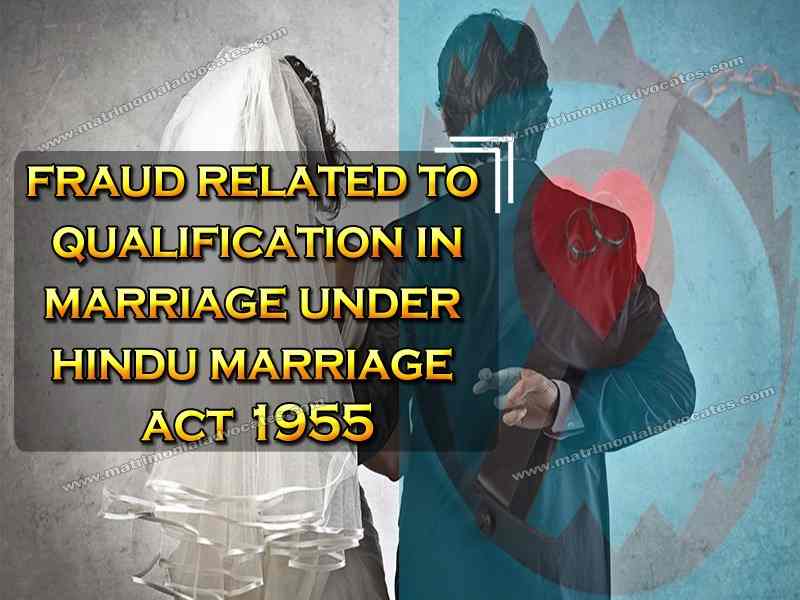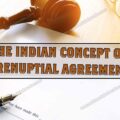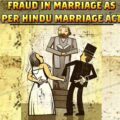
Even-though Hindu Marriage Act 1955 (hereinafter to be referred as the Act) doesn’t define the term fraud but the same has been explained in Indian Contract Act which says ‘Fraud’ means and includes any of the following acts committed by a party to a contract, or with his connivance, or by his agent1, with intent to deceive another party thereto or his agent, or to induce him to enter into the contract.[1] In terms of English law it can be classified into four types of error of personae(question of identity), error of condition, error of fortunae, and error of quality. It is a well known principle related to fraud which says “fraudulent misrepresentation or concealment doesn’t affect the validity of a marriage to which the parties freely consented with the knowledge of the nature of the contract. But if a person is induced to go through a ceremony of marriage by threat or duress or in a state of intoxication without any real consent to the marriage, it is invalid. In all such cases the test of validity is real consent to the marriage”[2]
The following article’s objective stands to explore legal perspective of fraud committed in regards to qualification in marriage under the Act. Section 5 of the Act lays down various conditions mandate to be fulfilled by both the partners to solemnize marriage under the Act. Those conditions are as follows:
A marriage may be solemnized between any two Hindus, if the following conditions are fulfilled, namely:—
(i) neither party has a spouse living at the time of the marriage;
(ii) at the time of the marriage, neither party— (a) is incapable of giving a valid consent to it in consequence of unsoundness of mind; or (b) though capable of giving a valid consent, has been suffering from mental disorder of such a kind or to such an extent as to be unfit for marriage and the procreation of children; or (c) has been subject to recurrent attacks of insanity
(iii) the bridegroom has completed the age of 21 [twenty-one years] and the bride, the age of 18 [eighteen years] at the time of the marriage;
(iv) the parties are not within the degrees of prohibited relationship unless the custom or usage governing each of them permits of a marriage between the two;
(v) the parties are not sapindas of each other, unless the custom or usage governing each of them permits of a marriage between the two;
In case any of the following conditions are not fulfilled then the marriage stands null and void.
Common law states that in order to commit fraud wicked mind is necessary and its absence doesn’t constitute an act as fraud. Acts committed in the past can’t be held as ground for divorce on fraud related to qualification to marriage which can be understood by the case of Flg Officer Rajiv Gakhar v. Bhavna @ Sahar Wasif[3]. The lady in present case at the time of marriage had made a declaration stating that she was spinster and a Hindu. However, later it was found that she was earlier married and had two children from her previous marriage. She followed the Islamic faith at that time and her name was Sahar. The husband filed a case before the court for dissolution of their marriage. The court held that the marriage was valid as after the dissolution of her first marriage the respondent had changed her faith to Hinduism. The court observed that the crucial time to determine the religious status of the parties is date of marriage.
But this can’t be concluded as in Ga Arife @ Arti Sharma v. Gopal Dutt Sharma[4] that court gave a dissenting judgment where wife’s conversion from Islam to Hinduism before marriage was not proved, it was held that there could be no marriage under HMA and so she could not claim divorce under the provisions of this Act.
When it comes to disclosure of material facts like age, then any concealment or false representation constitutes the marriage as void. This can be concluded from the case of Sunder Lal Soni v. Smt. Namita Jain[5] where it was held that “Non-disclosure of age and factum of having major children by husband at the time of marriage amounts to fraud and suppression of material facts having bearing on marriage. Marriage founded on fraud from very inception is a nullity”. In the same terms in the case of Babui Panmate v. Ram Agya Singh[6] it was held that “Misrepresentation as to the age of the bridegroom made to the mother who acted as an agent and the daughter consented for the marriage believing the statement to be true. It was held that the consent was vitiated by fraud”.
[1] Indian Contract Act S.17.
[2]http://14.139.60.114:8080/jspui/bitstream/123456789/16072/1/031_Hindu%20Marriage%20Act%2C%201955_Fraud%20as%20a%20Ground%20for%20Annulment%20%28520-534%29.pdf.
[3] Flg Officer Rajiv Gakhar v. Bhavna @ Sahar Wasif, AIR 2011 SC 2053.
[4] Ga Arife @ Arti Sharma v. Gopal Dutt Sharma, (2010) II DMC 424 (Del.)
[5] Sunder Lal Soni v. Smt. Namita Jain, AIR 2006 MP 51.
[6] Babui Panmate v. Ram Agya Singh, AIR 1968 Pat 190.





